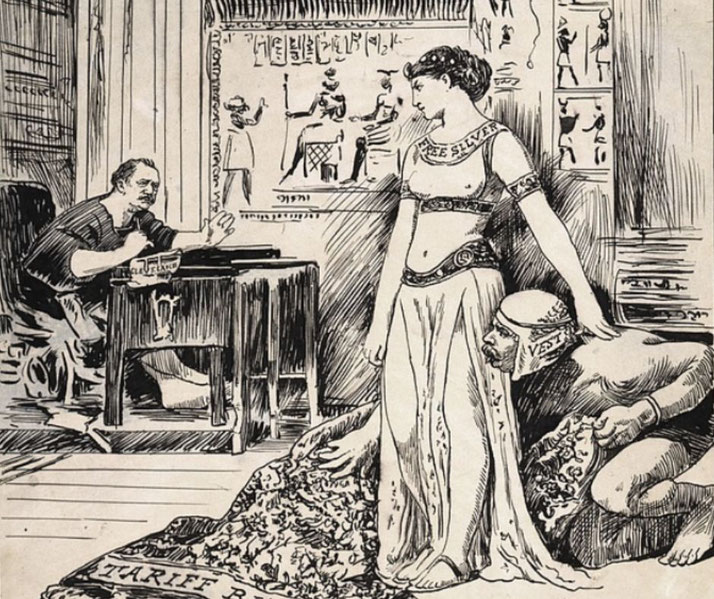The tragic reality of Cleopatra's life

More than 2000 years after her death, Cleopatra VII, the last active ruler of the Ptolemaic Kingdom of Egypt, is still one of the most well-known figures from ancient history.
Especially in the modern world, the details of her life and reign have been the subject of countless works of art, literature, and film.
However, the true story of her rise to power and her dramatic death is often overshadowed by the myths and legends that surround her.
Cleopatra's life was one of constant political intrigue in an effort to keep Egypt free from falling under the control of the powerful Roman Empire.
Despite Cleopatra's intelligence, charisma, and political acumen she was ultimately unable to save her kingdom from this fate.
How Cleopatra became pharaoh
Cleopatra VII was born in 69 BC into the Ptolemaic dynasty, a Hellenistic royal family that ruled Egypt after the death of Alexander the Great.
Specifically, the Ptolemies were of Macedonian-Greek origin who maintained their power over Egypt for nearly three centuries.
Their time in power, however, was not easy. As a foreign power, they faced frequent political instability and family infighting.
Cleopatra herself was the daughter of pharaoh Ptolemy XII Auletes. As a royal princess, she was educated in Egyptian and Greek traditions to prepare for her future role.
Sources indicate that she was highly intelligent and was one of the few Ptolemies to learn the Egyptian language, in addition to Greek, which was typically spoken by the ruling elite.
She is said to have also studied various subjects such as philosophy, mathematics, and astronomy, and was known for her sharp intellect and persuasive charm.

When her father died in 51 BC, the 18-year-old Cleopatra and her 10-year-old brother, Ptolemy XIII, were co-regents as per the tradition of the time.
However, it was a tumultuous co-rule, and Cleopatra began exploring ways to take sole control of the country from her younger brother.
In response, his advisors slowly turned Ptolemy XIII against her, and were even able to get her officially exiled from Egypt.
Cleopatra, however, was not one to be easily cast aside. She quickly gathered an army and returned to Egypt to take back control.
Her march into Egypt happened to coincide with the arrival in the country of the most powerful Roman military commander of the age: Julius Caesar.
Caesar had been in the process of pursuing his greatest rival, Pompey the Great, who he had defeated in battle and who had fled to Egypt for safety.
When Caesar landed in Egypt, he was told that Pompey had been executed by Ptolemy XIII's soldiers.
Disappointed that he had lost the opportunity to defeat his rival by himself, Caesar wanted to get revenge on the young pharaoh.
Recognizing this moment as an opportunity, Cleopatra approached Caesar with an offer of an alliance: the two of them could work together and combine their armies to defeat Ptolemy XIII.
As one version of the story goes, she had herself smuggled into Caesar's private rooms, wrapped in a carpet, to ask for his support.
Apparently, due to this outlandish introduction, Caesar was instantly captivated by her intelligence and charm, and he agreed to help her.
Their combined forces besieged the Egyptian capital city of Alexandria in 47 BC.
The forces of Ptolemy XIII were defeated, and the young pharaoh died while escaping.
With her brother's death, Cleopatra reclaimed the throne, this time alongside a new co-regent: her other younger brother, Ptolemy XIV.
Cleopatra's dramatic reign
Cleopatra time as pharaoh of Egypt spanned from 51 BC to 30 BC. Her first concerns were to stabilize her country after the civil war.
However, it was a period that saw constant political maneuvering. This was due to the fact that it was an era when Rome was actively expanding its power.
Cleopatra understood the importance of aligning herself with Rome to ensure Egypt's independence.
Firstly, she needed to project an image of authority for both her people to see, and to convince Rome to treat her with respect.
To this end, Cleopatra held several royal titles throughout her reign, including 'Thea Philopator,' which means 'Goddess Who Loves Her Father', which was a way of promoting her divine status in Egyptian society.
Furthermore, Cleopatra issued coins bearing her image, which was a traditional tool for spreading royal influence throughout her kingdom and their trading partners.

In fact, under Cleopatra's rule, Egypt experienced a period of relative stability and prosperity.
She was able to undertake major economic reforms, improved trade, and commissioned several building projects, including the construction of temples.
She also openly promoted the structures of traditional Egyptian religion and presented herself as the reincarnation of the goddess Isis.
This was a sign that Cleopatra wanted to preserve Egypt's culture and traditions in the face of increasing Roman influence.
This strategy even extended to her choice of clothing. She often dressed in traditional Egyptian attire, even when she was in the city of Rome.
Her relationships with Caesar and Mark Antony
It appears that Cleopatra used her relationships with powerful Roman men as a way of keeping her lands safe from encroachment.
She already had a close relationship with Julius Caesar from the events around her seizure of her throne from her brother, Ptolemy XIII.
Following her ascension, they began a romantic relationship, which produced a son, named Caesarion.
She was then invited by Caesar to visit Rome as a recognized ally. During her visit, she was given a golden statue in the temple of Venus Genetrix, which was considered a rare sign of honor.
However, the sudden assassination of Caesar in 44 BC, put Cleopatra and her son in a precarious position.

After Caesar's death, Cleopatra returned to Egypt and aligned herself with a new, powerful Roman general: Mark Antony.
He was one of the members of the Second Triumvirate that took charge of Rome.
Antony, like Caesar, was reportedly captivated by Cleopatra. In a similar fashion, their alliance also became personal and they three children together: Alexander Helios, Cleopatra Selene II, and Ptolemy Philadelphus.
While he was with Cleopatra in Egypt, Antony spent the winter of 41-40 BC in Alexandria.
This period was known as 'the Alexandrian Winter', during which the Romans were becoming deeply concerned that he was being 'seduced' by Cleopatra and her lavish royal lifestyle.
What seemed to confirm these fears was then Antony offered part of the Roman lands to her.
In the so-called 'Donations of Alexandria' in 34 BC, Mark Antony was reported to have distributed Rome's eastern territories to Cleopatra and their children, in return for her military support against his Roman rival: Octavian.
Cleopatra's Downfall and Death
Unfortunately, this agreement would lead to the end of both of their lives. At the climactic Battle of Actium in 31 BC, the combined naval forces of Antony and Cleopatra faced off against the fleets of Octavian.
Despite having a much larger force, Antony and Cleopatra were defeated. They had invested huge sums of money into this campaign, so the loss was seen as a major shift in the balance of power in the Mediterranean.
Running short of resources and lacking reinforcements to effectively response to Octavian as he started sailing for Egypt, Cleopatra's influence was starting to wane.
After the defeat at Actium, Antony and Cleopatra retreated to Alexandria. Antony, believing a false report that Cleopatra had died, committed suicide by falling on his own sword.
When Cleopatra was told of Antony's death, she was said to have been inconsolable.
Facing the prospect of being paraded in defeat through the streets of Rome by Octavian if she was captured, Cleopatra chose to end her own life instead.
The exact circumstances of her death still remain a mystery to this day, but the most widely told story is that she died by the bite of an asp or by poison on August 12, 30 BC.
The end of a free Egypt
With Cleopatra's death, the Ptolemaic dynasty finally came to an end. Egypt became a province of the Roman Empire, and Octavian, later known as Augustus, became the first Roman Emperor.
Sadly, Cleopatra's son by Julius Caesar, Caesarion, was executed by Octavian, extinguishing the last direct link to the Ptolemaic line.
Despite Cleopatra's tragic end, she is remembered as a powerful and influential queen who left a lasting impact on the ancient world.
Further reading
What do you need help with?
Download ready-to-use digital learning resources
Copyright © History Skills 2014-2025.
Contact via email
With the exception of links to external sites, some historical sources and extracts from specific publications, all content on this website is copyrighted by History Skills. This content may not be copied, republished or redistributed without written permission from the website creator. Please use the Contact page to obtain relevant permission.





